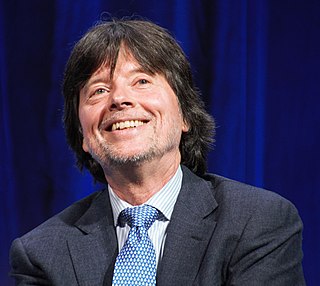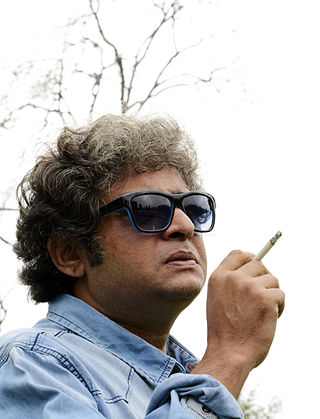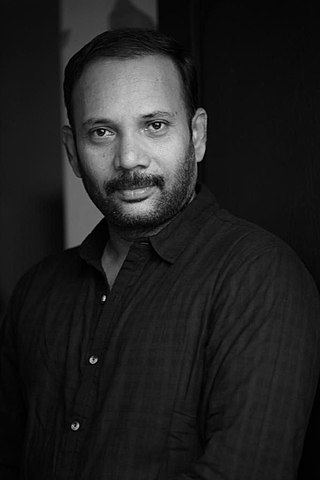Related Research Articles
The Academy Awards, commonly known as the Oscars, are awards for artistic and technical merit for the film industry. They are presented annually by the Academy of Motion Picture Arts and Sciences (AMPAS) in the United States in recognition of excellence in cinematic achievements as assessed by the Academy's voting membership. The Oscars are widely considered to be the most prestigious awards in the film industry.
The Academy Award for Best Documentary Feature Film is an award for documentary films. In 1941, the first awards for feature-length documentaries were bestowed as Special Awards to Kukan and Target for Tonight. They have since been bestowed competitively each year, with the exception of 1946. Copies of every winning film are held by the Academy Film Archive.

Kenneth Lauren Burns is an American filmmaker known for his documentary films and television series, many of which chronicle American history and culture. His work is often produced in association with WETA-TV or the National Endowment for the Humanities and distributed by PBS.
This is a list of films by year that have received an Academy Award together with the other nominations for best documentary short film. Following the Academy's practice, the year listed for each film is the year of release: the awards are announced and presented early in the following year. Copies of every winning film are held by the Academy Film Archive. Fifteen films are shortlisted before nominations are announced.

William Gale Vinton was an American animator and filmmaker. Vinton was best known for his Claymation work, alongside creating iconic characters such as The California Raisins. He won an Oscar for his work alongside several Emmy Awards and Clio Awards for his studio's work.

Stephen Fisher, known professionally as Fisher Stevens, is an American actor, director, producer and writer. As an actor, he is best known for his portrayals of Ben in Short Circuit (1986) and Short Circuit 2 (1988). He is also a documentary filmmaker, having won the Academy Award for Best Documentary Feature for The Cove (2009). He also directed the documentaries Crazy Love (2007) and Before the Flood (2016).

Jim Sheridan is an Irish playwright and filmmaker. Between 1989 and 1993, Sheridan directed three critically acclaimed films set in Ireland, My Left Foot (1989), The Field (1990), and In the Name of the Father (1993), and later directed the films The Boxer (1997), In America (2003), and Brothers (2009). Sheridan has received six Academy Award nominations for his work.
Charles Eli Guggenheim was an American documentary film director, producer, and screenwriter. He was the most honored documentary filmmaker in the academy history, winning four Oscars from twelve nominations.

SoumitraChatterjee was an Indian film actor, play-director, playwright, writer, thespian and poet. He is regarded as one of the greatest and most influential actors in the history of Indian cinema. He is best known for his collaborations with director Satyajit Ray, with whom he worked in fourteen films.

The LA Film Festival was an annual film festival that was held in Los Angeles, California, and usually took place in June. It showcased independent, international, feature, documentary and short films, as well as web series, music videos, episodic television and panel conversations.

Rabindranath Tagore is a 1961 Indian documentary film written and directed by Satyajit Ray about the life and works of noted Bengali author Rabindranath Tagore. Ray started working on the documentary in early 1958. Shot in black-and-white, the finished film was released during the birth centenary year of Rabindranath Tagore, who was born on 7 May 1861. Ray avoided the controversial aspects of Tagore's life in order to make it as an official portrait of the poet. Though Tagore was known as a poet, Ray did not use any of Tagore's poetry as he was not happy with the English translation and believed that "it would not make the right impression if recited" and people would not consider Tagore "a very great poet," based on those translations. Satyajit Ray has been reported to have said about the documentary Rabindranath Tagore in his biography Satyajit Ray: The Inner Eye by W. Andrew Robinson that, "Ten or twelve minutes of it are among the most moving and powerful things that I have produced."

Marshall Curry is an American documentary director, producer, cinematographer and editor. His films include Street Fight, Racing Dreams, If a Tree Falls: A Story of the Earth Liberation Front, Point and Shoot, and A Night at the Garden. His first fiction film was the Academy Award-winning short film The Neighbors' Window (2019).
The Colours of My Father: A Portrait of Sam Borenstein is a 1992 Canadian short animated documentary film directed by Joyce Borenstein.
Sunrise Over Tiananmen Square is a 1998 short animated documentary directed by Shui-Bo Wang and distributed by the National Film Board of Canada.

Samaresh Basu was an Indian writer in modern Bengali literature, known for his versatility and vast range of themes. He wrote under the pen name Kalkut. Basu was awarded the 1980 Sahitya Akademi Award in Bengali, by Sahitya Akademi, India's National Academy of Letters, for his novel, Shamba. He won the 1983 Filmfare Awards for Best Story for Namkeen.
The Inaugural Australian Academy of Cinema and Television Arts Awards, known more commonly as the AACTA Awards, presented by the Australian Academy of Cinema and Television Arts (AACTA), honoured the best Australian and foreign films of 2011 took place on two separate events, in Sydney, New South Wales: the AACTA Awards Luncheon, on 15 January 2012, at the Westin Hotel, and the AACTA Awards Ceremony, on 31 January 2012, at the Sydney Opera House. Following the establishment of the Australian Academy of Cinema and Television Arts, by the Australian Film Institute (AFI), these awards marked the inauguration of the AACTA Awards, but served as a continuum to the AFI Awards, which were presented by the AFI since 1958. The ceremony was televised on the Nine Network.
The Films Division of India (FDI), commonly referred as Films Division, was established in 1948 following the independence of India. It was the first state film production and distribution unit, under the Ministry of Information and Broadcasting, Government of India, with its main intent being to "produce documentaries and news magazines for publicity of Government programmes" and the cinematic record of Indian history.
The Witness: From the Balcony of Room 306 is a 2008 documentary short film created to honor the 40th annual remembrance of the life and death of Martin Luther King Jr. Directed by Adam Pertofsky, the film received a 2008 Oscar nomination in the "Best Documentary Short Subject" Category at the 81st Academy Awards.

Debesh Chattopadhyay is an Indian Bengali film & theatre director and actor. He has also acted in a few Bengali films.

Chezhiyan is an Indian filmmaker and director of photography who works primarily in the Tamil film industry. He received critical acclaim for his work in Kalloori (2007), Paradesi (2013) and To Let (2017).
References
- ↑ "The 41st Academy Awards (1969) Nominees and Winners". oscars.org. Retrieved 13 October 2011.
- ↑ "NY Times: The House That Ananda Built". Movies & TV Dept. The New York Times . 2012. Archived from the original on 16 October 2012. Retrieved 30 November 2008.